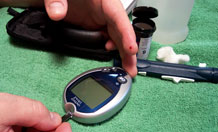
Dr Richard Oram won the Nick Hales Young Investigator Award and Dr Angus Jones won the Type 2 Diabetes Research Prize at the Diabetes UK Professional Conference
Awards success for ground-breaking diabetes researchers
Two scientists at the University of Exeter Medical School have won prestigious awards from the national charity Diabetes UK for findings which could improve the way clinicians test and treat people with diabetes. Dr Richard Oram won the Nick Hales Young Investigator Award and Dr Angus Jones won the Type 2 Diabetes Research Prize at the Diabetes UK Professional Conference in Liverpool earlier this month.
Dr Jones said: “We’re really excited that these awards have recognised the hard work and innovation of the Exeter research team and our partners around the country on diabetes, which is diagnosed in more than 3.2 million people in the UK alone. Our team is really focussed on helping clinicians and patients choose the most effective treatment for their needs, and also on understanding why diabetes medicines may work really well for one person but be ineffective or cause side effects for another, so treatments are used more effectively in the future.”
Dr Jones won his award for the discovery that a simple blood test could identify which patients with Type 2 diabetes will not respond to widely-used drugs designed to lower glucose. He found that those who have low levels of their own insulin or have antibodies against the cells that make insulin do not improve their blood sugar levels when treated with a commonly used diabetes treatment type called GLP-1 receptor agonists (including Exanatide and Liraglutide). Now, clinicians can use an inexpensive blood test to assess whether a person is likely to benefit from these therapies.
Dr Oram used a simple easy urine test developed in Exeter which can detect whether people with Type 1 Diabetes are still produce their own insulin. Until recently, it was widely thought that the disease kills off all insulin-producing beta cells in the pancreas. Now, using the new urine test and advanced analytical technology, the Exeter team can measure lower levels than ever before, leading to Dr Oram’s discovery that most people with Type 1 diabetes still produce a small amount of insulin. This means some of the insulin producing cells in the pancreas are evading the destructive process. The finding could have implications for boosting production of these cells to help patients in the future.
Dr Oram said: “We’re delighted with this fantastic recognition of the excellent standard of research at the University of Exeter Medical School. Our team is recognised as world-leaders in many areas of diabetes research. We work extremely closely with patients and the Royal Devon and Exeter NHS Foundation Trust, which ensures that our work is always designed to answer important questions for improving patient care.”
Both Dr Oram and Dr Jones are based in the new Research, Innovation, Learning and Development (RILD) building, on the RD&E site at Wonford.
Dr Alasdair Rankin, Director of Research for Diabetes UK, said: “We are very proud to reward the achievements of these outstanding projects, which have helped to advance our understanding of Type 1 and Type 2 diabetes and could potentially have a significant impact - both on research and on the lives of people with these conditions.”
Image via Shutterstock.
Date: 19 March 2014
